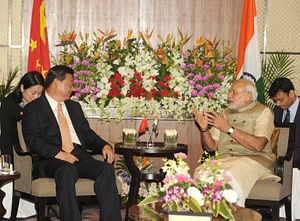There is little doubt that China and India together can determine the future of Asia. As India’s first prime minister, Jawaharlal Nehru, once said, if China and India hold together, the future of Asia is assured. Indeed, the countries share many similarities: large populations, ancient civilizations, developing economies, a history of being wronged by Western powers, immense potential to become global powers, etc. Thus it is not surprising that Chinese President Xi Jinping’s visit to India last week attracted global attention.
Then how fruitful was Xi’s visit to India? Some observers (here and here) believe that China missed a golden opportunity to forge a strong partnership with India by pointing to the border issue as a major obstacle. Nonetheless, a closer look at Xi Jinping’s speech shows that China is now ready to be flexible in at least three important areas vital to India’s national interests. They include the border dispute, India’s UN Security Council membership, and investment.
While many believe that the border dispute is the biggest obstacle in China-India relations, the border issue is actually not a big problem from a larger strategic perspective. As Xi said during his visit in India, “China has the determination to work with India through friendly consultation to settle the boundary question at an early date.” This is a strong signal to India that China is ready to solve the border issue in the not too distant future. Then the question for India is whether India is willing to take China’s offer.
There are good reasons to believe that India is also willing to resolve the border issue as soon as possible. This is because for India development should be the top priority for coming decades, which is a goal that China shares. This common national interest is the strongest force that brings the two giants together peacefully. Modi is a pragmatic leader who understands the importance of economic development for India and there is a good chance that the border issue will be resolved during Modi’s term.
Of course, there are both international forces and domestic forces that would like to continue the tensions between India and China. Japan certainly would benefit from a tense China-India relationship since it needs support from India to balance a stronger China in the East China Sea. But as some pointed out, an India-Japan alliance would be bad for India’s long-term development. Strong domestic nationalism might also pose a problem for Modi’s engagement with China and the same might also be said about Xi Jinping’s approach to India. Thus both Xi and Modi need to curb their sometimes overly strong nationalism at home in order to settle the border issue peacefully. It is certainly not easy, but resolving it would greatly enhance strategic trust between the two giants.
Overall, two things should be clear for the Indian leadership. The first thing is that India’s long-term development needs a warm relationship with China as China is a country that is willing and able to provide adequate capital, market access, and technology to India. The second thing is that India should think about its role in Asia. Right now, many Indians are a bit suspicious of China’s concept of a “new maritime silk road,” which reflects a sense of insecurity at a deep level for India. This needs to not be the case as China does not seek hegemony in the Indian Ocean. The so-called “string of pearls” idea is just a term for an unreal and imaginary threat posed by China to India.
A strong partnership between China and India needs strong leadership from both countries. Luckily, both Xi and Modi are strong leaders and now have a good personal relationship to enhance strategic trust between the two giants. Following Xi’s visit, the ball is in India’s court. All of Asia will benefit from India’s brave and strong leadership if it makes the right decisions regarding its relationship with China.

































